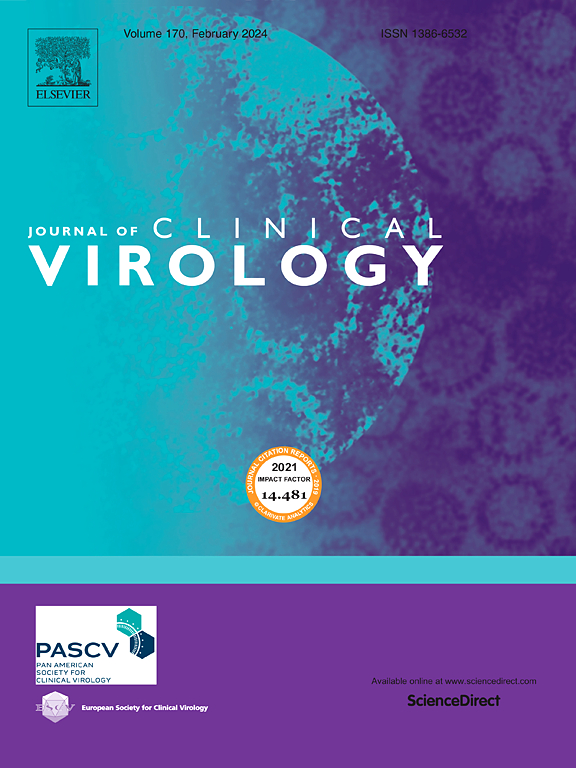High rate of RNAemia and impaired immunity in patients with immunodeficiency in the vaccination era
IF 3.4
3区 医学
Q2 VIROLOGY
引用次数: 0
Abstract
Background
Immunocompromised individuals, hemato-oncologic diseases or post-transplantation included, are, due to impaired immune response, at increased risk for severe and prolonged COVID-19. Observational Studies showed that SARS-CoV-2 RNAemia has been associated with poorer prognosis and higher disease severity.
Objective
The aim of this study was to investigate the occurrence of RNAemia and its association with anti-SARS-CoV-2 antibodies in immunocompromised COVID-19 patients. Risk factors for RNAemia were included in the analysis.
Study design
A retrospective study was conducted in 55 immunocompromised patients tested positive for SARS-CoV-2, who received treatment with monoclonal antibodies (mAb) between December 2021 and March 2022. Serological and virological tests were performed before mAb administration and clinical data were collected from electronic health records.
Results
Out of 55 patients, 35 % showed SARS-CoV-2 RNAemia. RNAemia was present in the 2 reported fatal cases. It was associated with negative testing for anti-receptor binding domain (RBD) IgG, anti-S2 domain of spike protein (S2) IgG and a lower leukocyte count. No association was found between previous COVID-19 vaccinations and the risk for RNAemia in immunocompromised patients.
Conclusion
The study underscores the importance of humoral response in controlling SARS-CoV-2 replication. RNAemia can serve as a potential biomarker for disease severity in immunocompromised individuals. Therefore, it should be considered in clinical settings for appropriate therapy decisions. Further research is needed to evaluate the pathophysiology and implications of RNAemia in immunodeficient patients with COVID-19.
疫苗接种时代免疫缺陷患者的高rnai率和免疫功能受损
免疫功能受损的个体,包括血液肿瘤疾病患者或移植后患者,由于免疫反应受损,患严重和长期COVID-19的风险增加。观察性研究表明,SARS-CoV-2 rnai血症与较差的预后和较高的疾病严重程度相关。目的探讨免疫功能低下的COVID-19患者RNAemia的发生及其与抗sars - cov -2抗体的关系。RNAemia的危险因素被纳入分析。研究设计:在2021年12月至2022年3月期间接受单克隆抗体(mAb)治疗的55例SARS-CoV-2免疫功能低下患者中进行了回顾性研究。在给药前进行血清学和病毒学检测,并从电子健康记录中收集临床数据。结果55例患者中35%出现SARS-CoV-2 rnai。在报告的2例死亡病例中存在rnai。与抗受体结合域(RBD) IgG、刺突蛋白抗S2域(S2) IgG检测阴性和白细胞计数降低有关。未发现既往COVID-19疫苗接种与免疫功能低下患者RNAemia风险之间存在关联。结论本研究强调了体液反应在控制SARS-CoV-2复制中的重要性。RNAemia可以作为免疫功能低下个体疾病严重程度的潜在生物标志物。因此,应在临床环境中考虑适当的治疗决定。需要进一步的研究来评估免疫缺陷患者的RNAemia的病理生理学和意义。
本文章由计算机程序翻译,如有差异,请以英文原文为准。
求助全文
约1分钟内获得全文
求助全文
来源期刊

Journal of Clinical Virology
医学-病毒学
CiteScore
22.70
自引率
1.10%
发文量
149
审稿时长
24 days
期刊介绍:
The Journal of Clinical Virology, an esteemed international publication, serves as the official journal for both the Pan American Society for Clinical Virology and The European Society for Clinical Virology. Dedicated to advancing the understanding of human virology in clinical settings, the Journal of Clinical Virology focuses on disseminating research papers and reviews pertaining to the clinical aspects of virology. Its scope encompasses articles discussing diagnostic methodologies and virus-induced clinical conditions, with an emphasis on practicality and relevance to clinical practice.
The journal publishes on topics that include:
• new diagnostic technologies
• nucleic acid amplification and serologic testing
• targeted and metagenomic next-generation sequencing
• emerging pandemic viral threats
• respiratory viruses
• transplant viruses
• chronic viral infections
• cancer-associated viruses
• gastrointestinal viruses
• central nervous system viruses
• one health (excludes animal health)
 求助内容:
求助内容: 应助结果提醒方式:
应助结果提醒方式:


